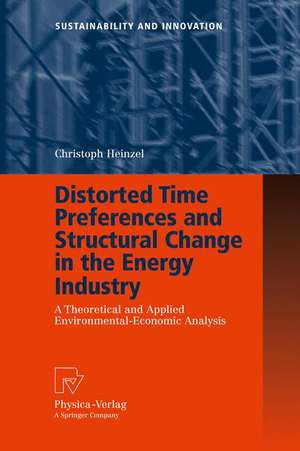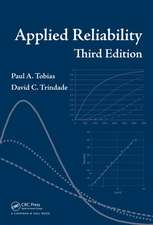Distorted Time Preferences and Structural Change in the Energy Industry: A Theoretical and Applied Environmental-Economic Analysis: Sustainability and Innovation
Autor Christoph Heinzelen Limba Engleză Hardback – 15 mai 2009
| Toate formatele și edițiile | Preț | Express |
|---|---|---|
| Paperback (1) | 635.01 lei 43-57 zile | |
| Physica-Verlag HD – 28 oct 2010 | 635.01 lei 43-57 zile | |
| Hardback (1) | 640.88 lei 43-57 zile | |
| Physica-Verlag HD – 15 mai 2009 | 640.88 lei 43-57 zile |
Din seria Sustainability and Innovation
- 24%
 Preț: 582.34 lei
Preț: 582.34 lei -
 Preț: 361.98 lei
Preț: 361.98 lei - 15%
 Preț: 637.28 lei
Preț: 637.28 lei - 15%
 Preț: 636.63 lei
Preț: 636.63 lei - 15%
 Preț: 636.63 lei
Preț: 636.63 lei - 15%
 Preț: 638.43 lei
Preț: 638.43 lei - 15%
 Preț: 635.80 lei
Preț: 635.80 lei - 15%
 Preț: 639.25 lei
Preț: 639.25 lei - 18%
 Preț: 947.35 lei
Preț: 947.35 lei - 15%
 Preț: 645.47 lei
Preț: 645.47 lei - 15%
 Preț: 642.03 lei
Preț: 642.03 lei - 15%
 Preț: 647.40 lei
Preț: 647.40 lei - 18%
 Preț: 995.97 lei
Preț: 995.97 lei - 20%
 Preț: 569.60 lei
Preț: 569.60 lei - 15%
 Preț: 638.24 lei
Preț: 638.24 lei - 15%
 Preț: 634.00 lei
Preț: 634.00 lei
Preț: 640.88 lei
Preț vechi: 753.97 lei
-15% Nou
Puncte Express: 961
Preț estimativ în valută:
122.63€ • 128.36$ • 102.07£
122.63€ • 128.36$ • 102.07£
Carte tipărită la comandă
Livrare economică 31 martie-14 aprilie
Preluare comenzi: 021 569.72.76
Specificații
ISBN-13: 9783790821826
ISBN-10: 3790821829
Pagini: 184
Ilustrații: XVI, 166 p.
Dimensiuni: 155 x 235 x 15 mm
Greutate: 0.43 kg
Ediția:2009
Editura: Physica-Verlag HD
Colecția Physica
Seria Sustainability and Innovation
Locul publicării:Heidelberg, Germany
ISBN-10: 3790821829
Pagini: 184
Ilustrații: XVI, 166 p.
Dimensiuni: 155 x 235 x 15 mm
Greutate: 0.43 kg
Ediția:2009
Editura: Physica-Verlag HD
Colecția Physica
Seria Sustainability and Innovation
Locul publicării:Heidelberg, Germany
Public țintă
ResearchCuprins
Foundations of the Theoretical Analysis.- A Theoretical Model of Structural Change in the Energy Industry.- Summary of Results, Discussion of Assumptions, and Policy Implications.- Foundations of the Applied Analysis.- Technology Choice Under Environmental and Technology Policies.- Optimal Moments of Transition Under Environmental and Technology Policies.- Conclusions.
Textul de pe ultima copertă
This study contributes to the economic discounting debate by examining the welfare and policy implications of distorted time preferences for private investments. The analysis is applied to the energy industry, where it is of particular importance. In the transition to low-carbon energy generation, distorted time preferences are shown to induce a further distortion, in addition to that from the emission externality. Its extent varies directly with the time lag in capital accumulation. In order to implement the socially optimal path, environmental policy needs to be complemented by technology policy. The theoretical findings are applied to the upcoming structural change in the German electricity industry in the 2010s.
Caracteristici
Includes supplementary material: sn.pub/extras















